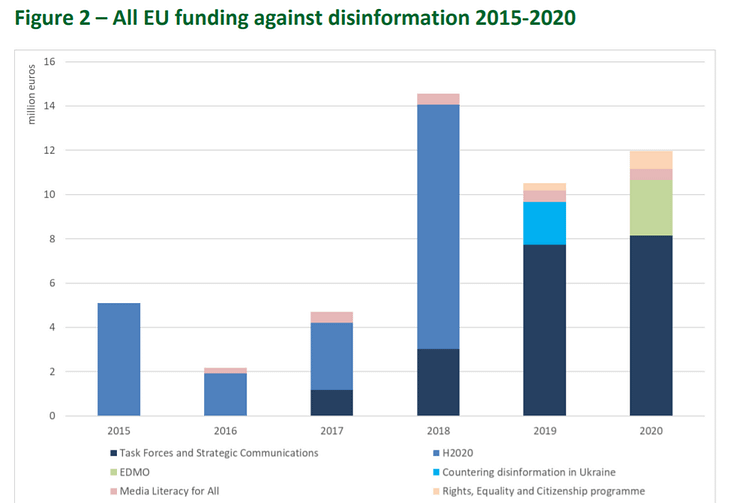If you’re at RightsCon this week, join us on Thursday at 5pm CEST / 11am EST for our Community Lab on “Gender and disinformation: towards a gender-based approach for researchers, activists, and allies”.
Also, the WeVerify Project is hosting a free two-day workshop on June 16 and 17 on technology and AI to counter disinformation. Don’t miss this either!
Disinfo News and Updates
- Oversight Board Ruling. Facebook will roll back its newsworthiness allowance for politicians, this among other changes following recommendations from the Oversight Board.
- E-commerce problems. The e-commerce platform Etsy is struggling to keep away COVID-19 misinformation in the form of illegal fake vaccination IDs and other kinds of anti-mask and anti-vaccine merchandise.
- Under the Radar. A new investigation by Mozilla into political advertising on TikTok finds that partisan political influencers supported by US political organisations are able to evade TikTok’s political ad ban.
EU Policy Monitor
In the EU Institutions
- European Court of Auditors. In a report released on Thursday, the European Court of Auditors (ECA) assessed the implementation of the EU’s disinformation action plan presented in December 2018, including the Code of Practice, which it finds “fell short of its goal“. Furthermore, it finds that “a piecemeal monitoring and reporting framework for the EU’s actions and the lack of long-term funding undermine the EU action plan’s accountability.” Meanwhile, the Commission has extended its monitoring programme on the Code’s platform signatories’ efforts to combat the spread of vaccine disinformation through the end of the year.
- European Parliament. At their first physical plenary session in a long time, MEPs will call for reinforced EU security against cyber threats with a new resolution on Thursday and will hold several debates on Thursday morning about human rights, democracy and rule of law topics. Behind the scenes, MEPs are also preparing amendments to the European Parliament’s report on the Digital Services Act, both in the main committee (Internal Market & Consumer Protection – IMCO) and in the opinion-giving committees, known as LIBE (Committee on Civil Liberties, Justice and Home Affairs), and ITRE (Committee on Industry, Research and Energy).
- Digital Literacy Expert Group. The Commission is seeking experts to assist in preparing its guidelines for teachers to combat misinformation. (Applications due June 29, a one-year assignment).
In Member States
- France. The French Secretary General of Defense and National Security (SGDSN) offered details on the national structure designed to detect information manipulation from foreign powers in the French elections.
- Slovakia. SK-NIC, the administrator of the Internet country code top-level domain for Slovakia, .sk, has released a call for projects to address disinformation and online conspiracies: “to clean up the virtual space from confusing news or half-truths, and especially how the solution of this problem will be approached.”

EU DisinfoLab Survey: Mapping Community Needs
Last year, the EU DisinfoLab conducted an initial scoping exercise to capture the type organisations tackling disinformation and information disorders as part of the ‘Many Faces Fighting Disinformation‘ initiative supported by the Friedrich Naumann Foundation. One year later, through an in-depth survey, we are seeking a more indepth and comprehensive understanding of the types of actions taking place, achievements, and especially the needs of organisations and individuals working in the field.
If you are a member of civil society operating in this space, we would very much appreciate your input in this research We are currently focused on EU-based actors.
The survey will take no more than 30 minutes, and is open until June 14.
Take Our Survey
If you have already been solicited for this survey, we thank you very much for your participation, and we hope you might also consider forwarding it to appropriate organisations that may be well suited to respond.
Research, Reports, Long Reads…
- Research from the German Marshall Fund explores how policy changes and strategic account suspensions reduced overall engagement with deceptive sites on Facebook and Twitter in Q1 of 2021.
- A recent publication in the Swiss Political Science Review studies the Italian Communications Regulatory Authority (AGCOM)’s response to Covid-19 disinformation to explore the role of regulatory agencies in agenda-setting processes”.
- Graphika uncovers a network of bogus media, including paid actors and journalists, spreading political narratives in support of Pakistan’s government and military.
- The Press Gazette alerts publishers to the threat of “website duplication”.
Events, Announcements, Training Opportunities
- June 7 – 11: This week is EDMO Week. Beginning yesterday, the European Digital Media Observatory is hosting its inaugural conference online.
- June 9: Heinrich Böll Stiftung Brussels is hosting an online discussion on Gendered disinformation: how should democracies respond to this threat. Register here.
- June 22 – 25: The Atlantic Council’s Digital Forensic Research Lab (DFRLab) hosts 360/Open Summit: The World in Motion. Check it out.
- July 1: Join the European Audiovisual Observatory for a webinar on the Digital Services Act Package and disinformation. Register here.
- The Digital Future Society launched an international Call for Solutions “Tech against disinformation” to help improve Fact-checking in Spain. Apply before July 9.
- The Investigative Journalism for Europe (IJ4EU) fund has opened two new calls for cross-border investigative journalism projects in the EU. Apply before July 14.
Jobs
- RIPE NCC, the European regional Internet registry, is hiring for several positions.
- Digital Action is looking for a Campaigns Adviser on democracy and technology.
- Democracy Reporting International (DRI) is looking for a German Elections Social Media Research Expert.
- The Atlantic Council’s Digital Forensic Research Lab (DFRLab) is seeking to hire an associate editor.
- CENTR, the Council of European National Top-Level Domain Registries, is hiring a Policy Officer.
- News literacy organisation Lie Detectors is recruiting trainees for a spring/summer 2021 start date.


